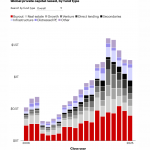The Danish venture capital industry is very much in its infancy but recent developments are ensuring that it becomes increasingly attractive to investors. Kim Forum Jacobsen of the Danish Growth Fund charts the country's rise and discusses its potential for future growth.
With a highly educated population, state-of-the-art research in areas such as biotech, wireless technologies and photonics, Denmark has all the hallmarks of an attractive market for investors.
However, the market is still in its teens, according to managing director Ole Hauskov from the Danish branch of 3i. Surveys show that the level of new entrepreneurs is below that of European market leaders such as The Netherlands. Furthermore, the venture market in Denmark is young, albeit rapidly growing. For 3i, that means it’s time to enter the market.
‘If you think of the Danish market as a person, you get the picture of a teenager: fully grown in body and with the greatest achievements in front of him,’ adds Hauskov. He is optimistic about Denmark as well as the rest of the Nordic region, which 3i regards as one market. And 3i is already putting their money where their mouth is, going from zero to 125 investments in the Nordic region in just one year, purchasing Swedish Atle, Finnish based SFK and starting a 3i operation in Denmark.
For 3i, the Danish market has a number of attractions, most of them common to the Nordic markets. ‘We are looking at a population with a world-class penetration of both PCs and internet and a sophisticated wireless infrastructure matching the fact that around 60 per cent of the population owns a cellular phone. It establishes a number of first mover opportunities.’
When asked to highlight the main reason 3i has set up shop in the Nordic region, the investment director cites life sciences and the supporting infrastructure. ‘Considering the Scandinavian Medicon Valley is home to one of the largest concentrations of new biotech ventures in Europe, the region is ripe and therefore 3i has to be present.’
Medicon Valley is a programme for biotech entrepreneurs in Denmark and Sweden that offers laboratory facilities, office space as well as financial and business support. The Valley is a good example of how much the government and the private sector can accomplish through working in concert to improve conditions for innovation. Many of these efforts are, of course, financial, with the government funded venture capital vehicle The Danish Growth Fund as a central player, but it takes more than just money to exploit market potential.
Changing the mindscape
With one of the world’s highest levels of education one would assume the number of successful entrepreneurs in Denmark to be high. But despite success stories such as the photonics company Giga, acquired by Intel for $1.25bn and Microsoft’s friendly takeover of Danish ERP provider Navision for even more, it remains indisputable that Denmark has much more potential for fostering successful entrepreneurs.
Part of the explanation may lie in the historical context of the Danish science base. In the areas of life sciences and high-tech, Denmark is producing cutting-edge research. But, historically the incentives to commercialise university-led research have been limited.
Building on a strong academic tradition, which has led to the current high level of research, we are seeing radical changes unfolding. The days are over where Danish scientists basically faced one choice upon graduation: public or private, where the ‘private’ choice was one among a few well-established companies.
Thanks in part to the boom in information technology, and increasing pressure from performance-based university funding, the mindscape has changed towards a more entrepreneurial setting. And this is drawing attention from investors like 3i: ‘During the last few years, the number of people who have seriously considered starting their own business has increased dramatically,’ says 3i’s Hauskov. ‘In 1997, only 13 per cent had considered starting up for themselves, now it’s 25 per cent. Bearing in mind the high technological and educational level, some of these start-ups are bound to offer interesting investment opportunities.’
More entrepreneurs seeking capital raises the question about the financial infrastructure in Denmark. A study from 2001 by The Danish Growth Fund based on annual accounts from the majority of Danish venture capital funds shows that the Danish venture market is growing rapidly.
Changing the moneyscape
The study reveals that the Danish venture market has been undergoing dramatic changes in the last few years. Nevertheless, it is still behind leading markets in Europe. This creates opportunities for new players to enter. Especially in the seed and pre-seed segments, where demand for capital and business skills are greater than the supply.
The result of the 2001 study of the venture capital market ranks Denmark at a mid-range position on the list of efficient venture markets in Europe. This is further underlined by the fact that the percentage of seed investments only accounts for 6 per cent of the total capital invested in 2000.
According to a study of the Danish venture capital market by Rebecca Harding of the London Business School, the Danish market is ‘at a watershed in its development’. According to Harding, managing the transition to a full-scale venture capital market requires close co-operation between key players. Drawing on foreign capital and expertise can improve the chances of successfully completing this transition process.
One of the reasons private venture capital is relatively scarce in the early stages goes back to the funding of the venture capital funds. Danish institutional investors have only shown limited interest in making direct venture investments let alone investing in venture capital funds. The allocation of total assets in unquoted investments and venture capital funds is between 0.5 per cent and one per cent. In comparison, the corresponding Dutch figures are around five per cent.
As with the mindset, the financial picture is also changing. The general low on investment activity has slowed the development of the venture market. The institutional investor’s policy plays a major role for the liquidity of the venture companies, and during the last two quarters of 2001 all large investors have been under pressure.
Expanding the view
All this is prompting Danish companies and venture capital funds to look abroad to find capital and new investment prospects. Foreign venture funds also have eyed the Danish market and may become a driving force in the further expansion of the Danish venture capital market. As a forerunner 3i has established an office in Denmark. But counting Apax opening in Stockholm and several strategic alliances, it is safe to say that not only are the Danes looking outside the borders for capital, but the interest is returned.
The aggregated size of the Danish Venture Capital market is DKr15bn. The number of Danish players has increased from 33 in 1998 to 67 by the end of 2001; meanwhile, capital under management has increased from DKr3.5bn to approximately DKrl5bn. The volume of venture investments has increased by more than 200 per cent, from DKrO.9bn in 1998 to DKr3bn in 2000.
In absolute terms, more is invested across all investment stages. Especially the start-up stage has experienced extraordinary growth rates in the last couple of years. In 2000, six per cent was invested in the seed stage, 34 per cent in start-up (the corresponding percentage in 1998 was only nine per cent), and 55 per cent in the expansion stage, while five per cent was invested in other investment funds.
IT, software, biomedical and biotech companies received 70 per cent of the investments in 2000.
Copyright © 2002 Danish Growth Fund
Kim Forum Jacobsen is a communication consultant at the Danish Growth Fund.
Established in 1992, the Danish Growth Fund is part of the government’s efforts to promote Danish industry. Operating independently in the capital market, it strengthens development and innovation in Danish industry by facilitating the supply of venture capital in terms of start-up equity and high-risk loans. For more information please visit www.vf.dk


























